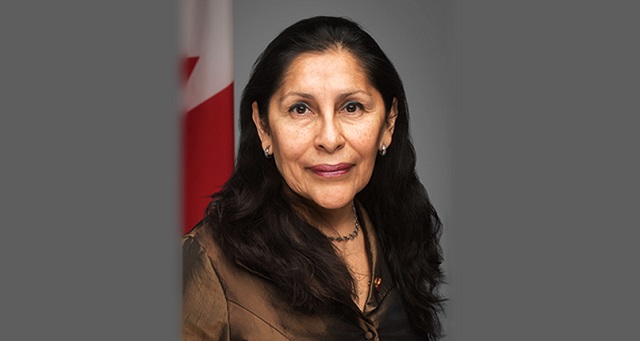Energy
Oil and gas industry critic in Canadian senate flew 100K in past year to climate conferences: report

Senator Rosa Galvez
From LifeSiteNews
Senator Rosa Valdez has traveled extensively to advocate against the use of fossil fuels.
Environmental hypocrisy from left-leaning Canadian politicians has again been exposed after records show a senator known for her opposition to the nation’s oil and gas industry in the past year alone jetted over 100,000 kilometers to attend so-called “climate change” conferences.
Senator Rosa Galvez, who was appointed by Prime Minister Justin Trudeau in 2016, according to newly filed records as per Blacklock’s Reporter, show that over the past year she flew some 100,084 kilometers (62,189 miles) to attend climate change junkets.
Galvez’s multiple trip charges were said to have been paid by the Parliamentarians’ Network for a Fossil Fuel Free Future along with the American Society of Civil Engineers and other sponsors.
According to the records, Galvez continued to speak harshly against oil and gas, which is a large part of the Canadian economy, right up until taking a jet to fly to a May 25 Casablanca conference on “energy justice.”
The senator also attended a May 2 meeting in Sao Paulo, Brazil about “fossil fuel phaseout in the Amazon” as well as multiple other conferences whose themes were focused on phasing out the use of oil and gas.
Galvez is a self-described environmentalist, and according to her official biography, she is one of Canada’s “leading experts in pollution control and its effects on human health.” She has claimed that the “climate crisis is the greatest challenge of our time and will require an unprecedented transformation.”
Thus far, she has not commented on her recently disclosed travel.
In 2019, as chair of the environment committee, she was tasked with overseeing hearings on a bill that was ruled unconstitutional, which impacts Canada’s oil and gas sector, that is Bill C-69, also known as the “no-more pipelines” bill.
Since taking office in 2015, the Trudeau government has continued to push a radical environmental agenda like the agendas being pushed by the World Economic Forum’s “Great Reset” and the United Nations’ “Sustainable Development Goals.”
When it comes to so-called man-caused “climate change,” which leftists have been preaching about for years, a June 2017 peer-reviewed study by two scientists and a veteran statistician found that most of the recent global warming data have been “fabricated by climate scientists to make it look more frightening.”
LifeSiteNews recently reported on another display of hypocrisy on how Canada’s “Climate Change Ambassador,” appointed by self-proclaimed socialist Environment Minister Steven Guilbeault, has billed taxpayers $254,000 for travel expenses in just two years on the job.
There have been two recent court rulings that have dealt a blow to Trudeau’s environmental laws, however, after provinces including Alberta and Saskatchewan took on the federal government over laws impacting the oil and gas industry.
The most recent was the Federal Court of Canada on November 16 overturned the Trudeau government’s ban on single-use plastic, calling it “unreasonable and unconstitutional.”
The second ruling comes after Canada’s Supreme Court recently sided in favor of provincial autonomy when it comes to natural resources. The Supreme Court recently ruled that Trudeau’s law, C-69, dubbed the “no-more pipelines” bill, is “mostly unconstitutional.” This was a huge win for Alberta and Saskatchewan, which challenged the law in court. The decision returned authority over the pipelines to provincial governments, meaning oil and gas projects headed up by the provinces should be allowed to proceed without federal intrusion.
The Trudeau government, however, seems insistent on defying the recent rulings by pushing forward with its various regulations.
It has also used the climate “change” agenda to justify applying a punitive carbon tax to Canadians. As reported by LifeSiteNews, Trudeau’s carbon tax is costing Canadians hundreds of dollars annually, as government rebates are not enough to compensate for high fuel costs.
Business
Canada’s climate agenda hit business hard but barely cut emissions

This article supplied by Troy Media.
 By Gwyn Morgan
By Gwyn Morgan
Canada is paying a steep economic price for climate policies that have delivered little real environmental progress
In 2015, the newly elected Trudeau government signed the Paris Agreement. The following year saw the imposition of the Pan-Canadian Framework on Clean Growth and Climate Change, which included more than 50 measures aimed at “reducing carbon emissions and fostering clean technology solutions.” Key among them was economy-wide carbon “pricing,” Liberal-speak for taxes.
Other measures followed, culminating last December in the 2030 Emissions Reduction Plan, targeting emissions of 40 per cent below 2005 levels by 2030 and net-zero emissions by 2050. It included $9.1 billion for retrofitting structures, subsidizing zero-emission vehicles, building charging stations and subsidizing solar panels and windmills. It also mandated the phaseout of coal-fired power generation and proposed stringent emission standards for vehicles and buildings.
Other “green initiatives” included the “on-farm climate action fund,” a nationwide reforestation initiative to plant two billion trees, the “Green and Inclusive Community Buildings Program” to promote net-zero standards in new construction, and a “Green Municipal Fund” to support municipal decarbonization. That’s a staggering list of nation-impoverishing subsidies, taxes and restrictions.
Those climate measures come at a real cost to the industry that drives the nation’s economy.
The Trudeau government cancelled the Northern Gateway oil pipeline to the northwest coast, which had been approved by the Harper government, costing sponsors hundreds of millions of dollars in preconstruction expenditures. The political and regulatory morass the Liberals created eventually led to the cancellation of all but one of the 12 LNG export proposals.
Have all those taxes and regulatory measures reduced Canada’s fossil-fuel consumption? No. As Bjorn Lomborg has reported, between the election of the Trudeau government in 2015 through 2023, fossil fuels’ share of Canada’s energy supply increased from 75 to 77 per cent.
That dismal result wasn’t for lack of trying. The Fraser Institute has found that Ottawa and the four biggest provinces have either spent or forgone a mind-numbing $158 billion to create just 68,000 “clean” jobs, increasing the “green economy” by a minuscule 0.3 percentage points to 3.6 per cent of GDP at an eye-watering cost of more than $2.3 million per job.
That’s Canada’s emissions reduction debacle. What’s the global picture? A decade after Paris, 80 per cent of the world’s energy still comes from fossil fuels. World energy demand is up 150 per cent. Canada, which produces roughly 1.5 per cent of global emissions, cannot influence that trajectory. And, as Lomborg writes: “achieving net zero emissions by 2050 would require the removal of the equivalent of the combined emissions of China and the United States in each of the next five years. This puts us in the realm of science fiction.”
Does this mean our planet will become unlivable? A U.S. Department of Energy report issued in July is grounds for optimism. It finds that “claims of increased frequency or intensity of hurricanes, tornadoes, floods and droughts are not supported by U.S. historical data.” And it goes on: “CO2-induced warming appears to be less damaging economically than commonly believed and aggressive mitigation policies could be more detrimental than beneficial.”
U.S. Secretary of Energy Chris Wright responded to the report by saying: “Climate change is real … but it is not the greatest threat facing humanity … (I)mproving the human condition depends on access to reliable, affordable energy.”
That leaves no doubt as to where our largest trading partner stands on carbon emissions. But don’t expect Prime Minister Mark Carney, who helped launch the Glasgow Financial Alliance for Net Zero (GFANZ) at COP 26 in that city in 2021 and co-chaired it until this January, to soften his stand on carbon taxes. His just-released budget imposes carbon tax increases of $80 to $170 per ton by 2030 on our already struggling industries.
Doing so increases Canadian businesses’ competitive disadvantage with our most important trading partner while doing essentially nothing to help the environment.
Gwyn Morgan is a retired business leader who has been a director of five global corporations.
Troy Media empowers Canadian community news outlets by providing independent, insightful analysis and commentary. Our mission is to support local media in helping Canadians stay informed and engaged by delivering reliable content that strengthens community connections and deepens understanding across the country.
Energy
Canada following Europe’s stumble by ignoring energy reality

Family in Spain eating by candlelight during a blackout, April 2025
From Resource Works
Canada’s own 2024 grid scare proves we’re on the same path unless we change course.
Europe’s green-energy unraveling is no longer a distant cautionary tale. It’s a mirror — and Canada is already seeing the first cracks.
A new Wall Street Journal investigation lays out the European story in stark detail: a continent that slashed emissions faster than anyone else, only to discover that doing so by tearing down firm power before its replacement existed comes with brutal consequences — collapsing industry, sky-high electricity prices, political fragmentation, and a public increasingly unwilling to subsidize wishful thinking.
The tragedy isn’t that Europe tried to decarbonize quickly.
The tragedy is how they did it: by insisting on an “or” transition — renewables or fossil fuels — instead of what every energy-literate nation outside Europe pursued: renewables and fossil fuels, working together while the system evolves.
And here’s the uncomfortable truth:
Canada has already had its first European-style crisis. It happened in January 2024.
Canada’s early warning: the January 2024 electricity crunch
Most people have already forgotten it, because our political class desperately wanted you to. But in January 2024, Western Canada came within a whisker of a full-blown energy security breakdown. Alberta, Saskatchewan, and B.C. were stretched to their limit. The grid was under cascading stress. Contingency plans were activated. Alberta came terrifyingly close to rolling blackouts.
It wasn’t caused by climate change. It wasn’t caused by a mysterious cyberattack.
It was caused by the same structural brittleness now crippling Europe:
- Insufficient firm power, after years of political messaging that we could “electrify everything” without adding real generating capacity.
- Overreliance on intermittent sources not backed by storage or gas.
- A planning system that punted risk into the future, betting the grid could be stretched indefinitely.
The January 2024 event was not a blip. It was a preview.
Our European moment in miniature.
But instead of treating it as the national wake-up call it should have been, B.C. did something telling — and deeply damaging.
The B.C. government’s response: attack the messenger
Just a couple of years ago, an economist publicly warned about the economic price of emerging system vulnerabilities due to a groaning stack of “clean economy” policies.
The B.C. government didn’t respond with data, evidence, or even curiosity. Instead, a cabinet minister used the safety of legislative privilege — that gold-plated shield against accountability — to launch nasty personal attacks on the economist who raised the concerns, which themselves had originated in the government’s own analysis.
No engagement.
No counter-analysis.
No willingness to consider the system risks.
Just slurs — the very definition of anti-intellectual governance.
It was a moment that told the whole story:
Too many policymakers in this province believe that energy systems obey politics, not physics.
Physics always gets the last word.
Europe shows us what political denial turns into
The WSJ reporting couldn’t be clearer about the consequences of that denial:
- Germany: highest domestic electricity prices in the developed world.
- U.K.: highest industrial electricity rates among major economies.
- Industrial flight: chemical plants closing, data centres frozen, major players hinting at exiting Europe entirely.
- Grid instability: wind farms paid tens of millions not to generate because the grid can’t handle it.
- Public revolt: rising support for parties rejecting the entire green-transition agenda.
- Policy whiplash: governments rushing to build gas plants they swore they’d never need.
Europe is now an object lesson in how good intentions, executed poorly, can produce the exact opposite of what was promised: higher prices, higher volatility, declining competitiveness, and a public ready to abandon climate policy altogether.
This is precisely what January 2024 warned us about — but on a continental scale.
The system cost we keep pretending doesn’t exist
Every serious energy expert knows the truth Europe is now living: intermittent renewables require massive amounts of redundant capacity, storage, and backup generation. That’s why the U.K. now needs 120 gigawatts of capacity to serve a demand previously met with 60–70 gigawatts, even though electricity use hasn’t meaningfully grown.
This is the math policymakers prefer not to show the public.
And it’s why B.C.’s refusal to have an honest conversation about firm power is so dangerous.
If we electrify everything without ensuring affordable and abundant natural gas generation, we’re not building a green future.
We’re building Europe, 10 years early.
The lesson for Canada — especially for B.C.
Here is what Europe and January 2024 together say, in one clear voice:
1. There is no energy transition without firm power.
Renewables are part of the system, but they don’t run the system. Natural gas does. Hydro does. Nuclear does. Pretending otherwise is how you end up with rolling blackouts.
2. Political denial makes crises worse.
When ministers attack economists instead of answering them, it signals that ideology is running the show. Europe learned the cost of that. We will too, unless we change course.
3. Affordability is the foundation of public consent.
Europe lost the room. Once people see their bills double while factories close, the climate agenda becomes politically radioactive.
4. B.C. has an advantage Europe would kill for.
Europe dreams of having an abundant, local, low-carbon firm-power fuel like northeastern B.C.’s natural gas. We treat it like a political liability. That’s not strategy. It’s negligence.
5. The transition will fail if we don’t treat electricity like the national security asset it is.
Without energy, there is no industry.
Without industry, there is no prosperity.
Without prosperity, there is no climate policy that survives the next election cycle.
What we need now
Canada must embrace an “and” strategy:
Renewables and natural gas. Electrification and realism. Climate ambition and economic competitiveness.
January 2024 showed us the future in a flash. Europe shows us the end state if we keep ignoring the warning.
We can still choose something better. But only if we stop pretending that energy systems bend to political narratives — and start treating them with the seriousness they demand.
Resource Works News
-

 Business2 days ago
Business2 days agoRecent price declines don’t solve Toronto’s housing affordability crisis
-

 Censorship Industrial Complex2 days ago
Censorship Industrial Complex2 days agoA Democracy That Can’t Take A Joke Won’t Tolerate Dissent
-

 Daily Caller2 days ago
Daily Caller2 days agoTech Mogul Gives $6 Billion To 25 Million Kids To Boost Trump Investment Accounts
-

 Business2 days ago
Business2 days agoOttawa’s gun ‘buyback’ program will cost billions—and for no good reason
-

 MAiD24 hours ago
MAiD24 hours agoFrom Exception to Routine. Why Canada’s State-Assisted Suicide Regime Demands a Human-Rights Review
-

 Business2 days ago
Business2 days agoCanada’s future prosperity runs through the northwest coast
-

 National2 days ago
National2 days agoCanada Needs an Alternative to Carney’s One Man Show
-

 Alberta2 days ago
Alberta2 days agoAlberta will defend law-abiding gun owners who defend themselves









